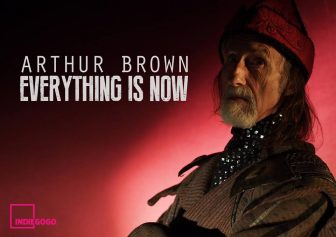
Arthur Brown • Hit Channel
HIT CHANNEL EXCLUSIVE INTERVIEW: April 2017. We had the great honour to talk with a legendary singer and performer: Arthur Brown. He is best known for the single “Fire” (1968) He led The Crazy World of Arthur Brown and Kingdom Come and influenced numerous artists. He is currently working on the documentary “Everything Is Now”. Read below the very interesting things he told us:
There is a crowdfunding campaign on Indiegogo for your documentary “Everything Is Now”. Can you give us some more information about this?
I’ve been with Sam Walker, who is making the film, for about 10 years. For some years, Sam Walker, who is a brilliant drummer, was with The Crazy World as a drummer, so we had many-many adventures together. He now has his own solo career as a performer singing as well as playing multiple instruments. He also is drumming with Charlie Winston, whose second record (ed: “Hobo” -2009) sold one million in France. Because of our adventures together, Sam who has a great appreciation of theatre –his father is a very well-known local painter and he has done very wonderful work indeed- has inherited some of his sensitivity to colours, life, visuals, theatre… Because of our association together and all the adventures and stories I tell, Sam decided that he wanted to make a film about my life including my musical experiences. I will say that two other people tried and it didn’t work, but with Sam it does work. That’s the background of it and of course I ‘ve been pulling in all the information I can find: historical events, poetry, press etc. I am covering these very tumultuous times and depict them. The society was in question and we were looking for new answers to problems that we thought always led to war. Also, in theatre there was a huge burst of creativity due to the atmosphere of the time. The radio stations played all kinds of music, not only the popular music of the day, which was quite unexpected. You could listen to people of different kinds like The Beatles and Frank Zappa, who became a cultural force.
Are there any other projects you are currently involved with?
Yes, next year is the 50th anniversary of “Fire”, so I’m touring with that. Also in September, I am down in Rio with Alice Cooper. There is a big festival down there. They chose an artist that they want to perform there, which is Alice Cooper, and he chose an artist that he wants to write some numbers with, and then perform with him on stage. So, he chose me to do that. It will be my first time in Rio and it will be on national TV for 6 times. So, it looks like it is resulting in a Crazy World tour in South America. I just came back from a tour of America and now they are putting me on some of the big festivals in America, so I am developing new stage acts for over there. There are huge festivals there, so I have to think in a different way than clubs. Also, I will have a completely different stage act for a year after. I am thinking quite far ahead. I am also in the beginning of a project about the process of developing music from brainwaves. I am going to record with Luciana Haill and a Japanese gentleman making music just from brainwaves. No hands, no instruments. Things crazy in the normal manner. It will feature in “Everything Is Now” film too.
Do you have happy memories of the concerts at the legendary UFO Club?
Yes. It was such a wonderful environment being among people who are stretching the boundaries of art and of their lives. So, in the UFO Club when you played, there were light shows being invented, poets inventing new ways of writing poetry, dancers, political people giving out new ideas on how society could be organised. There were theatre people coming down there. I had an interview with Maria Callas, the opera singer. Tom Jones and various other people came down there and of course the Floyd were playing, the Soft Machine, Tomorrow and that led to influence the whole European psychedelic movement. It was linked with the American one, through Joe Boyd (ed: UFO Club co-owner and Pink Floyd, Nick Drake, Fairport Convention producer), who was American. There was a flow of ideas coming from America, and all those bands that became psychedelic, including The Beatles, benefited greatly from not only what happened in America, in San Francisco and other places, but also from the UFO Club because it was a kind of a melting pot of different influences on all areas of art. And they all were going on at the same time and anybody who played down there was influenced by these. Everybody was listening to everybody else. There was also Keith Emerson of Emerson, Lake & Palmer. At the time, he was in a band called The Nice and they were listening to everybody. There is nobody who didn’t have an influence from everybody else in the club. The Floyd tried out various things. They were very experimental. It was a communal artistic environment.
Can you tell us a few more things about your meeting with Maria Callas? Nobody knows that.
Yes, she came down to the UFO Club. I had a little interview with her. Because I improvised a lot both in terms of movement and in terms of lyrics and music, she asked me: “Oh, what are you thinking about when you are on stage?” And I said: “To be quite honest, I try not to think at all”.
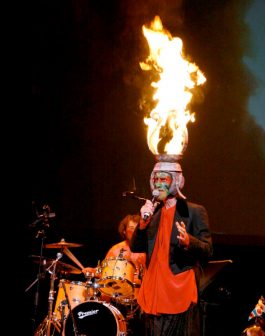 Was Vincent Crane (keyboards) an easy-going person to work with?
Was Vincent Crane (keyboards) an easy-going person to work with?
Vincent was quite brilliant. He was a composer, a conductor and a superb instrumental player. Some people have the creative gift and among those people there is a different balance in their attitude. So, Vincent was what we call now bipolar: He could be really funny, telling jokes and making funny comments, both very witty. But when he was on the top end of his manic side, then yes he was very difficult indeed. He could occasionally be violent. So, he had that classical sort of creative soul. But at the same time he had a great interest about world, about people. He had a great appreciation for other people who were excellent in their fields.
What was Pete Townshend’s role on your first album?
He was quite important. He came down where we played, at the UFO Club. He got us a deal with the record company and he liked the story of the concept album. He understood that. When we recorded it, we had almost no experience in the studio but he did have. So, he helped us create demos of the album. It was very important that he appreciated the music we did. Also, he was very good at sounds. Kit Lambert, the producer of the album (ed: also manager of The Who and boss of Track Records), possibly with Pete, decided to put brass and strings on it.
Why the original Crazy World of Arthur Brown band broke up?
The band was originally one drummer, Drachen Theaker from the north of England, myself and Vincent. Vincent was playing bass pedals. So, we were just three of us. So, we didn’t have a guitar. No guitar, no bass. We were all quite strong characters. Drachen was an interesting percussionist, he played classical music with the Scottish National Orchestra, and was a tabla player of choice at that time for Indian musicians coming over. We all liked different kinds of music. Vincent was more into classical and jazz, especially experimental jazz. Drachen liked classical, but he loved avant-garde music and Stockhausen and electronic music and he was a kind of rebellious and avante-garde spirit. When Vincent was on his manic side, he couldn’t stand him. So, that part of Crazy World changed when Vincent said in the middle of a tour that he couldn’t stand Drachen anymore. And being on his manic side, I had to choose between them. I needed someone who could play the chords, so Drachen who was behaving very badly, was the one who had to leave. Then Carl Palmer joined, and that line up lasted for another year and a half and came to a close probably because we have been doing a lot of tours and we needed to create some music. Lambert and Stamp, the managers we had at the time, they were heavily into hard drugs and we were not very happy with their management anymore. It all came to an end when we were offered a deal with one of most popular American record companies (ed: Columbia Records). We were offered 2/3 of a million dollars, nowadays it costs 5 million or so, and I turned it down. I agreed with leaving Lambert and Stamp management, but I didn’t want to leave their record company, Track Records. For a while, my mind was very chaotic. As a result, Carl Palmer and Vincent Crane had to leave and formed Atomic Rooster and I formed Kingdom Come and it was very nice.
When you finished “Journey” (1973) with Kingdom Come had you realised that it was so ahead of its time?
Well, when we did it we knew there wasn’t anything else like that at the time: Having a drum machine and no drummer. I was playing the drum machine. We were experimenting with synthesizers and it was interesting. Yes, we knew that it was unique. I didn’t realise that the drum machine in the next coming decades became one of the staples of pop. At that time we also were experimenting with the idea of using brainwaves, but the equipment wasn’t so advanced in those days. That’s why now I am able to go and experiment on brainwaves, because the equipment technology has now become a lot more improved.
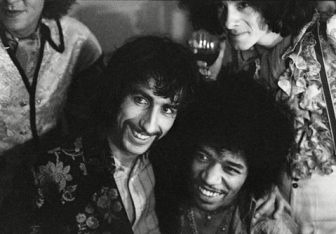 How helpful was Dave Edmunds’ production on “Journey”?
How helpful was Dave Edmunds’ production on “Journey”?
We had Victor Peraino from America on synthesizers. He was playing VCS-3, Theremin, mellotron, as well as a more rock keyboard. We had Andy Dalby on guitar, Phil Shutt on bass and myself on vocals and drum machine. We had a lights man (Dennis Taylor) to make a complete audio visual show, an atmospheric kind of show. One thing that most people don’t know about Dave Edmunds is his love for experimental music and recording equipment. He has an incredible ear for sound. He would spend sometimes a whole night, 10 hours, just trying to get one symbol from the drum kit the way he wanted. I remember one occasion when he paid a drummer to come over from Canada. He knew that he could play the way he wanted that kind of sound. He recorded it and recorded it and recorded it and then the guy went back. Then, Dave used the sound and did the drums himself. So, he is an incredible sonic manipulator. Dave worked at the Rockfield Studios for many years. He started on a 4-track, then on a 8-track, then on a 16-track that Kingsley and Charles Ward (ed: the owners) brought there. He was able to use that equipment in that studio and he knew how to make the music sound. He knew how to record the voice and the bass. He had a personal interest in the sound, on what it is played. He was a brilliant part of the final outcome of the album. As far as the structure of the album, that was already formed before the recordings.
Can you tell us about your friendship with Jimi Hendrix and his offer to form a band together?
We met in England in several theatres. He was already popular before “Fire” became a hit and of course before he started setting his guitar on fire. Initially, he didn’t want to tour with us because of our stage act. He said: “Oh, I can’t go on stage after that”. But later he started setting his guitar on fire and he said: “Now, it’s fine”. We did some TV shows, one of them in Holland when we took turns. He did a number, then we did a number, then he did a number… We got on well and we played at quite a few festivals in America. When “Fire” was a hit, we were on the top 4 bands. So, I got to know him and we hit it off well and then we were in New York. There was a place called Steve Paul’s The Scene club. He would play bass and different musicians would come in and I was singing. There was a jam, not on set numbers. We would jam for an hour and a half and that was unbelievable. Out of that and a couple of other things, maybe he thought of forming a band together. The other thing was that his record company was the same people, Lambert and Stamp. In fact, when “Fire” was a hit, it was partly due to the fact that we got airplay on AM and FM stations, but Hendrix himself took the record and went to the “black stations”, as we called them then, and he said: “Here, play this motherfucker man” and so we were played on all different kinds of stations, that’s why “Fire” topped the charts. We were in all magazines, and the album itself also reached no.7 on Billboard’s Pop Albums chart. So, we had that emotional tune and we played together. He was in a place where he had done with rock ’n’ roll format, and he was looking to other sides like John Coltrane did and he would do them. Initially he played blues and rock. He looked to the Western music, poetry and he become interested in classical. What Jimi wanted was to keep the Experience, and then to have Vincent Crane on keyboards and myself on vocals. He wanted in the background tapes of Wagner and visual projections, making a multimedia presentation. Unfortunately, Vincent collapsed and went to a mental hospital for several months. Although, Jimi imagined a whole new direction, I thought I wanted to do something else. In the end, we can never change our past.
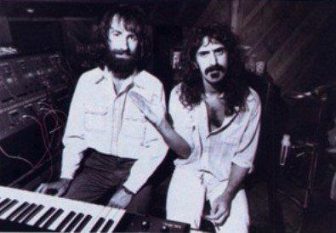 Was it an interesting experience to jam on stage at the Miami Pop Festival (May 1968) with Frank Zappa and John Lee Hooker?
Was it an interesting experience to jam on stage at the Miami Pop Festival (May 1968) with Frank Zappa and John Lee Hooker?
(Laughs) It certainly was. It was quite amazing. John Lee Hooker has always been one of my idols because of the freedom, the elastic rhythms, the directness of his lyrics and the fact that he wasn’t bound by 4 bars or 14 bars. He could play as many bars as he wanted to in the tune and it’s great. So, I had the chance to be on stage with John Lee Hooker and of course Frank, who always loved the blues. I remember him when The Mothers were supported by Howlin’ Wolf, he came out and said to the audience: “This is a travesty! We should be supporting this man”. He loved his music so much. So, for me it was great to be on stage with Frank and John Lee Hooker. I had another occasion: I played with John Lee Hooker and Jimi Hendrix. It was a special chance because John Lee and Jimi were who they were.
Are you frustrated with the longstanding misconception that you are a crazy guy? I think you are a very sane man.
(Laughs) I mean, looking at the world, I must say honestly this is a crazy world. That is what is considered normal, but I think it’s absolutely crazy. But that makes me being labeled as crazy.
How important was the period you lived in Paris to your later career?
Oh, it was fundamental. Because it was there that I came in contact with the beatnik type of life in a real way. Leaving in Montmartre and playing clubs in Montmartre. All things in Montmartre were associated with art. It is a place where all arts take place because you have all the alternative lifestyle, sexual, transvestite clubs… So, yes you had all the alternative lifestyle and way of thinking. Also, the audience was completely different. The energy was extraordinary when you came on stage. This is where I first used a fire helmet and then make-up and costumes. It was a different world. I met the Beatniks, jazz bands, Salvador Dalí came down. It was a completely different time. One thing that is very important is that in Paris, I started experimenting with music. We played three sets every night and we didn’t have time to rehearse new songs. So, it was an opportunity to improvise on stage. I realised that everything is possible. It was the beginning of the psychedelic music. People like Janis Joplin came out at that time.
A young guy called Davy Jones (aka David Bowie) came to watch your show in Paris.
And later in England. We lived down the street from each other. He came down to watch the theatrics of Kingdom Come and The Crazy World. He was a very interesting man.
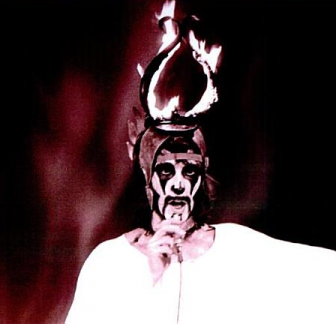 Is it a bit strange that the people you influenced made more money than you?
Is it a bit strange that the people you influenced made more money than you?
(Laughs) Well, you know in one way, yes but in another way, no. All the stars of the underground including Bowie, Soft Machine, Floyd and everybody else were touring heavily. Because when everybody went to America and toured and made quick money in the ‘70s through to the ‘80s, I decided that I wanted to concentrate on my family life and I left rock. The music business is a business of creating myths for public to swallow. When you are not around making commercial things, your myth will not be represented. When I came back to it, it took me some years to recreate the myth.
Do you think social media like Youtube and Facebook have helped younger listeners to learn about you music?
Definitely, yes. Someone can put on a site or whatever a fire helmet. They can have footage of it. Someone else might say: “we created this” and my fans would put footage saying: “No, no. It is originated here, by Arthur Brown” or things like that. So, it has been very useful. A lot of young people are interested in the roots of the things. They can click on a fact and find the origin of that style of music etc. So, it’s been a great help. Also, you are not depending on the money of the record company to get your music out. You know, the record company, the publishers, the agency, they have a manager to try to get all those together to come out with ideas and see what they can promote and how to present it.
Did you get to know The Beatles?
Not instrumentally, you know. I mean, everybody in those days went to a club called The Speakeasy. This is where you went when you were in town and played gigs. You could go at 1 or 2 o’clock in the morning. They were occasionally there. They were there at a table. It was after “Sgt. Pepper’s” (1967) when they gave up playing concerts. And then it was John Lennon, during the next period, when McCartney had Wings. I occasionally met Paul McCartney, he always maintained an interest in my career. So, I got to know him.
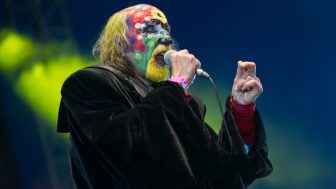 Was Syd Barrett a crazy kind of guy? Paul McCartney, Pete Townshend and Eric Clapton who were more famous than Pink Floyd, went to the UFO Club to watch Syd Barrett playing.
Was Syd Barrett a crazy kind of guy? Paul McCartney, Pete Townshend and Eric Clapton who were more famous than Pink Floyd, went to the UFO Club to watch Syd Barrett playing.
He certainly had a very creative relationship with the guitar. He had a kind of delicate mentality, so possibly his relationship with drugs affected his mind. He was certainly quite wild in terms of music and the energy he was putting out.
A huge “THANK YOU” to Mr Arthur Brown for his time and to Sam Walker for his valuable help.
Official Arthur Brown website: http://www.arthur-brown.com
Official Arthur Brown Facebook page: https://www.facebook.com/arthurbrownmusic
“Everything Is Now” Indiegogo page: https://www.indiegogo.com/projects/arthur-brown-everything-is-now-music-film#
